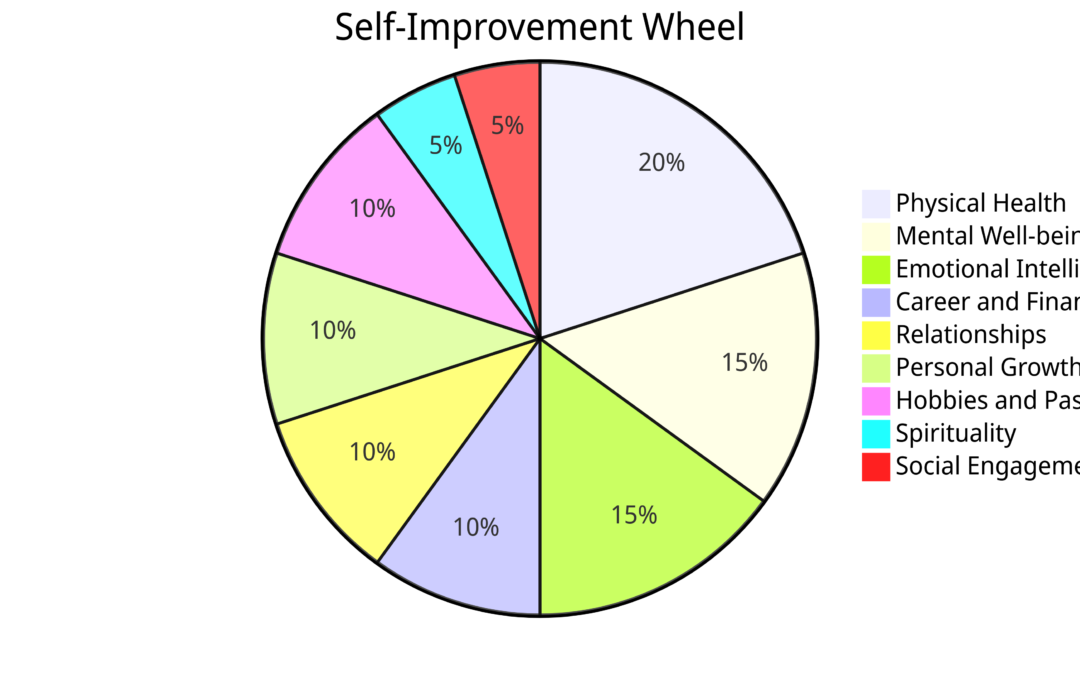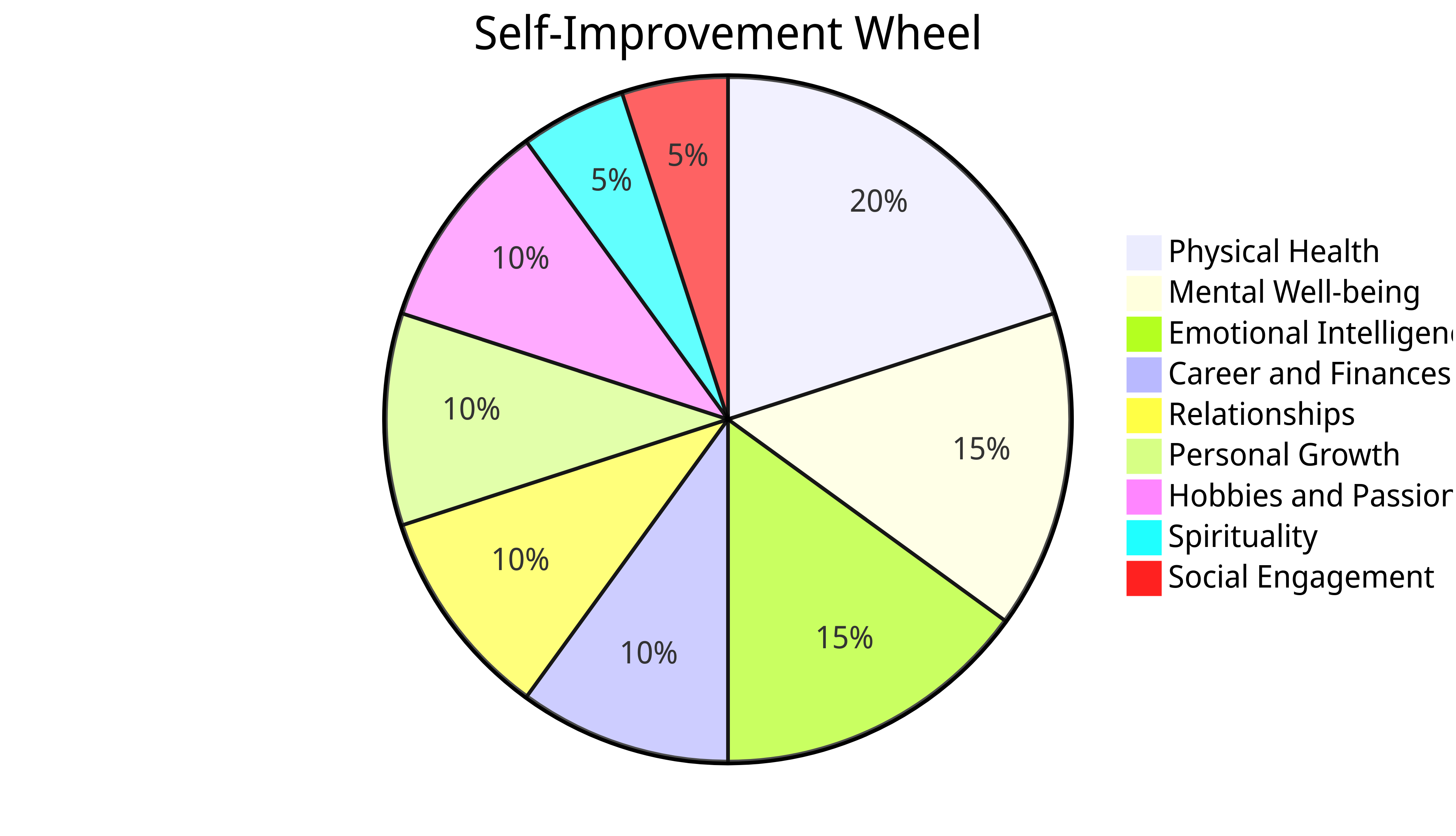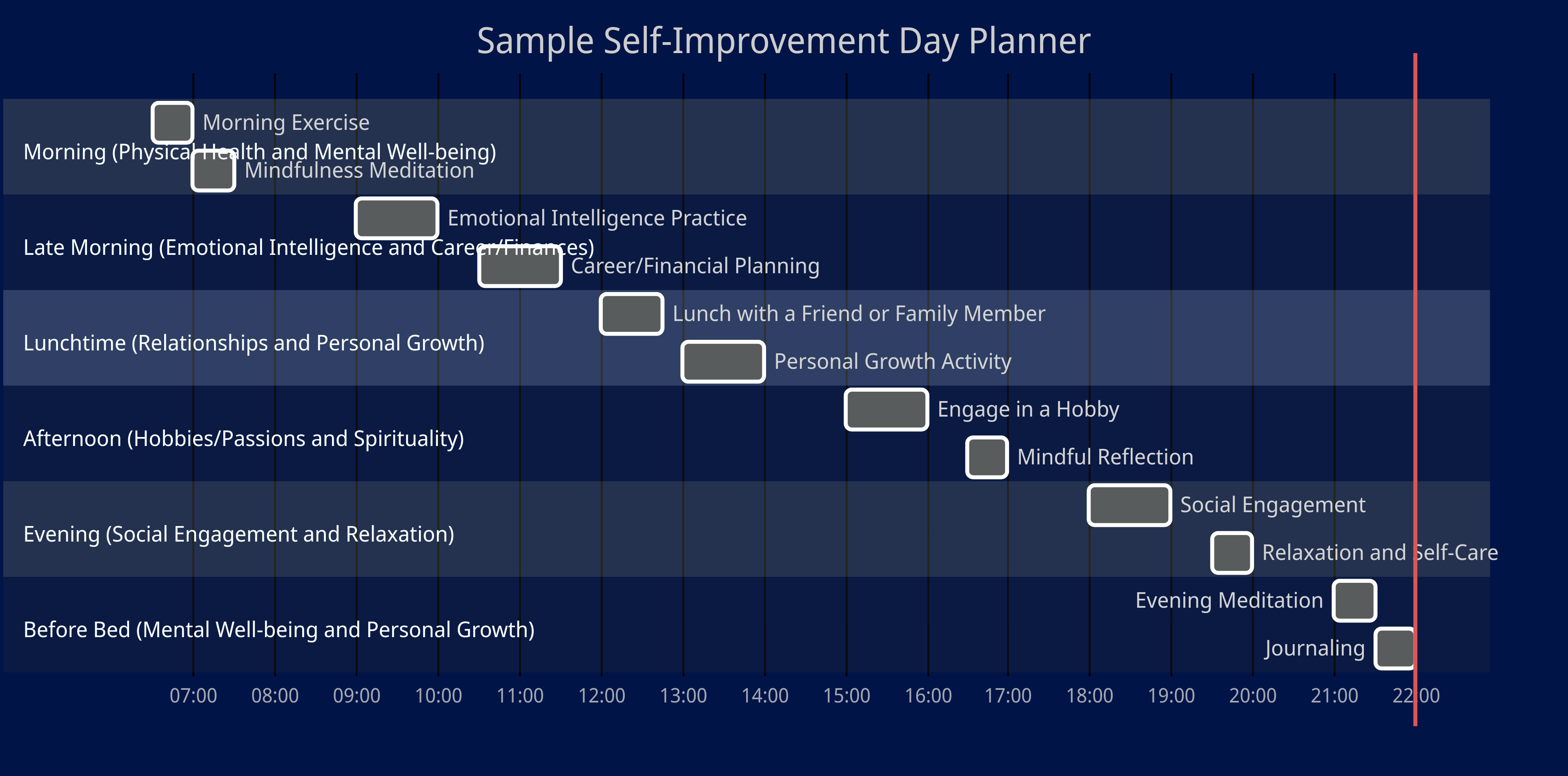
In the pursuit of self-improvement, it's important to adopt a holistic approach that can address various dimensions of your life. One way to help visualize this is to imagine your self-improvement journey as a wheel with multiple spokes, each representing a different aspect of your well-being.
Just as a wheel requires all its spokes to be strong and balanced for smooth movement, your life benefits from harmony across these dimensions. Here's how to create a balanced self-improvement plan:
Physical Health: Prioritize regular exercise, balanced nutrition, and sufficient sleep. A healthy body is the foundation for all other improvements.
Mental Well-being: Practice mindfulness, meditation, and stress management techniques to enhance mental clarity and reduce anxiety.
Emotional Intelligence: Develop empathy, self-awareness, and emotional regulation skills to strengthen your relationships and communication.
Career and Finances: Set clear goals for career advancement and financial stability. Continuous learning and financial planning are essential.
Relationships: Nurture meaningful connections with friends and family. Communication, empathy, and conflict resolution are key skills here.
Personal Growth: Cultivate a growth mindset. Challenge yourself with new experiences, hobbies, and self-improvement projects.
Hobbies and Passions: Dedicate time to your interests and hobbies. Pursuing your passions brings joy and fulfillment.
Spirituality: Explore your spiritual beliefs and practices, whether through religion, meditation, or nature.
Social Engagement: Get involved in your community or volunteer. Social engagement fosters a sense of belonging and purpose.
To create a balanced self-improvement plan, assess where you currently stand in each dimension and set specific, achievable goals. Remember that self-improvement is an ongoing journey, and balance across these dimensions contributes to a fulfilling and meaningful life. The Self-Improvement Wheel serves as a reminder that personal growth is not one-dimensional but a multi-faceted endeavor that enriches every aspect of your life.
This chart visually represents various dimensions of personal development and self-improvement that individuals can focus on to enhance their overall well-being.
With this pie chart in mind, let's make a day planner to check off these boxes!

Introduction: Welcome to our post on harnessing the incredible potential of shadow work journaling for personal growth. Here we will delve into the concept of shadow work journaling, explain how it can transform your life, and provide valuable insights into getting started.
What is Shadow Work? Shadow work, originally introduced by Swiss psychiatrist Carl Jung, is a journey into the depths of your psyche. Jung believed that our minds are divided into three main components: the ego (conscious thought), the personal unconscious (hidden thoughts), and the collective unconscious (shared human experiences).
At the core of shadow work lies the concept of the "shadow self." This shadow self represents the darker aspects of our personality, encompassing negative thoughts and behaviors like jealousy, greed, and power-seeking tendencies. Typically, these aspects are suppressed and often lead to feelings of shame.
What is Shadow Work Journaling? Shadow work journaling is a powerful tool based on Jung's idea of making the unconscious conscious. By shedding light on the hidden corners of your personality, you can heal and transform these shadowy aspects into sources of inspiration and growth and let go of the past.
A shadow work journal serves as a safe space to document and process these negative traits without judgment. Think of it as a form of "soul searching" that requires unflinching honesty with yourself. The goal is to embrace and nurture these neglected parts of your identity.
For instance, imagine someone struggling with intense envy and jealousy. Through shadow work journaling, they can uncover the roots of these emotions, leading to a deeper understanding of themselves and their motivations. This newfound awareness can empower them to achieve personal success and become the supportive person they aspire to be.
How Shadow Work Journaling Benefits You Now, let's explore how shadow work journaling can facilitate your personal growth. Before starting in, it's crucial to recognize the adverse impact of ignoring your shadow self. Suppressing these aspects can lead to anxiety, depression, self-sabotage, self-loathing, and more. Additionally, it can strain your relationships and prevent you from achieving emotional resilience.
By embracing your shadow self through shadow work journaling, you can:
Increase Self-Awareness: Just as you wouldn't discard a car for a malfunctioning starter, you can use shadow journaling to become more self-aware. Understanding how you operate is the first step toward self-care.
Gain Clarity: Shadow work encourages introspection, allowing you to explore your emotions and reactions more deeply. This newfound clarity can help you better understand your behaviors and motivations.
Live a Fulfilling Life: Integrating your shadow qualities, as Jung believed, leads to a more fulfilling life. It addresses the root causes of your well-being challenges.
Heal Relationships: Healthy relationships thrive when you can be your authentic self. Shadow work reduces projection, enabling you to interact with others authentically and foster compassion.
Build Emotional Resilience: Shadow work may bring up negative feelings and painful memories, but confronting these emotions builds emotional resilience over time.
Foster Honesty and Vulnerability: Being honest with yourself is essential for honesty with others. Shadow work journaling helps you practice emotional vulnerability and extend it to the people in your life.
Preparing for Shadow Work Journaling Before embarking on your shadow work journey, it's essential to prepare for potential challenges. Consider the following steps:
Find Support: Shadow work can be emotionally triggering, so having a support system in place is advisable. This can include mental health professionals or trusted friends who understand your journey.
Identify Your Shadow: Recognizing shadow behaviors may require practice. Reflect on situations where you reacted strongly or negatively, as these often reveal your shadow traits.
Set Goals: Begin your shadow work with a clear goal in mind. Understand why you want to engage in this practice, whether it's for improved relationships, personal growth, or self-acceptance.
Go at Your Own Pace: Shadow work can be emotionally taxing, so don't rush the process. Go at your own pace, and be patient with yourself.
Working Through Your Shadow
Working through your shadow can be as simple as examining your behavior when triggered. For example, if you feel slighted by a colleague's praise, shadow work may involve exploring why you seek recognition or have a habit of attributing your work to others.
5 Steps for Effective Shadow Journaling
To make the most of your shadow work journaling experience, follow these steps:
Choose a Safe Space: Find a comfortable and safe environment to allow your emotions to flow freely.
Select a Topic: Use writing prompts to guide your journaling sessions, especially when you're unsure of what to write about.
Set a Timer: Use a timer to maintain focus during your journaling sessions.
Add Reflections and Drawings: Don't limit yourself to text; include drawings, photos, and symbols to express yourself authentically.
Review and Reflect: Periodically review your journal entries to identify patterns in your thinking and behavior, gaining further insight into your shadow traits.
Tips for Shadow Work Journaling
As you gain experience, you'll develop your journaling style. Here are some tips to enhance your shadow work journaling practice:
- Describe your joy and pain.
- Practice honesty, even when it's challenging.
- Celebrate any growth, no matter how small.
- Enjoy the journey of self-discovery.
- Observe without judgment.
- Acknowledge the need for uncomfortable truths.
- Celebrate your willingness to grow.
Remember that shadow work can be emotionally intense. Practice self-care by using affirmations to close your journaling sessions and scheduling activities that help you recharge and restore your emotional balance.
30 Shadow Work Journal Prompts to Explore
Whether you're new to journaling or an experienced practitioner, journal prompts can be invaluable. They encourage fresh perspectives and help you delve deeper into your shadow traits. Here are some prompts to consider:
Describe a recent situation where you felt anger or frustration. What triggered these emotions, and how did you react?
Reflect on a childhood memory that still affects your behavior today. How does it shape your actions and decisions?
Write about a time when you felt jealous or envious of someone. What did this reveal about your insecurities?
Explore a recurring negative thought or belief you hold about yourself. Where did it originate, and how does it impact your life?
Write a letter to your younger self, offering guidance and compassion for the challenges you faced.
Describe a relationship in your life that brings out the worst in you. What patterns of behavior do you notice in this relationship?
List five qualities or traits about yourself that you're afraid to acknowledge. Why are you hesitant to embrace these aspects of your identity?
Reflect on a time when you judged someone harshly. What does this say about your own insecurities or biases?
Write about a dream or recurring nightmare you've had. Analyze the symbolism and emotions associated with it.
Explore a hidden talent or interest you've neglected. Why have you kept it in the shadows, and how might it benefit you to bring it to the forefront?
Write a letter of forgiveness to someone who has hurt you deeply. How does letting go of this resentment affect your inner peace?
Describe a situation where you've compromised your values or integrity. What motivated this compromise, and how did it make you feel?
Reflect on a time when you felt like an imposter or fraud. What accomplishments and qualities of yours did you overlook?
Explore your relationship with power and control. How do you assert control in your life, and when do you feel powerless?
Write about a secret you've kept from others. What keeps you from sharing it, and how does it impact your sense of authenticity?
Describe a time when you experienced shame or guilt. What actions or choices led to these emotions, and how can you make amends?
Reflect on the role of fear in your life. What are you most afraid of, and how does it limit your potential?
Write a letter to someone you admire but have never expressed your admiration to. What's holding you back from sharing your feelings?
Explore a time when you felt like a victim. How can you reclaim your power in that situation or similar ones?
Describe a person you've had a strong negative reaction to. What qualities in them trigger these reactions, and what does it reveal about you?
Reflect on your relationship with money. How does it affect your self-worth and decisions?
Write about a time when you've sabotaged your own success or happiness. What were the underlying reasons for this self-sabotage?
Explore your relationship with your body image. How do your perceptions impact your self-esteem and overall well-being?
Describe a time when you've been overly critical of yourself. What unrealistic standards or expectations were you holding yourself to?
Reflect on a habit or addiction that you've struggled with. What emotions or voids does it help you cope with?
Write a letter of gratitude to someone who has supported you through your shadow work journey.
Explore your relationship with authority figures. How do you react to authority, and how does it mirror your inner dynamics?
Reflect on your dreams and aspirations. Are there any dreams you've buried because of self-doubt or fear of failure?
Write about a time when you've betrayed someone's trust. What motivated this betrayal, and how can you make amends?
Explore the role of ego in your life. When has your ego driven you to make decisions that were not in your best interest?
Conclusion Embrace the profound journey of shadow work journaling with open arms. By acknowledging and nurturing your hidden thoughts, emotions, and beliefs, you pave the way for lasting personal growth. Don't shy away from your shadows; instead, unlock the incredible benefits of shadow work journaling and become a more authentic, empowered, and self-aware version of yourself. Your path to transformation begins with a pen and a journal.
The article is about a fascinating case study involving the brain of a centenarian nun. This case sheds light on the intricacies of vascular dementia, a type of neurodegenerative disorder that affects cognitive function.
Vascular Dementia:
Vascular dementia is a form of dementia primarily caused by impaired blood flow to the brain. It typically results from the blockage or damage of blood vessels in the brain, leading to a reduction in oxygen and nutrients reaching brain cells. As a consequence, brain cells become damaged or die, and cognitive functions decline.
The Nun's Brain:
The article focuses on the brain of a 104-year-old nun who generously donated her brain for scientific study upon her passing. Her decision to do so has provided invaluable insights into the pathology of vascular dementia.
Key Findings:
1. Microinfarctions: Researchers discovered multiple small areas of brain damage called microinfarctions. These are caused by tiny blood clots or blockages in the blood vessels supplying the brain. Microinfarctions are a hallmark of vascular dementia and can lead to cognitive impairments.
2. Cognitive Reserve: Despite the presence of these microinfarctions, the nun's brain displayed signs of cognitive reserve. Cognitive reserve refers to the brain's ability to adapt and compensate for damage. In this case, the nun's brain had developed alternative pathways to maintain cognitive function, allowing her to live a long and mentally active life.
3. Neuropathology: The study also examined the neuropathological changes associated with vascular dementia. It revealed that the accumulation of damage to blood vessels in the brain, along with the microinfarctions, contributed to the development and progression of the disease.
Significance:
This case study underscores the importance of understanding the role of vascular factors in dementia. It highlights the need for early detection and intervention to prevent or slow the progression of vascular dementia. Additionally, the concept of cognitive reserve suggests that cognitive stimulation and healthy lifestyle choices may help mitigate the impact of vascular damage on cognitive function.
Conclusion:
The brain of the 104-year-old nun provides valuable insights into the complex nature of vascular dementia. It emphasizes the importance of ongoing research into neurodegenerative disorders and the potential for individuals to maintain cognitive function even in the face of brain damage. Ultimately, this knowledge can inform strategies for preventing and managing vascular dementia in the aging population. And it also lets us know that saying our prayers and cutting back on nightlife might be another key to cognitive longevity.





























